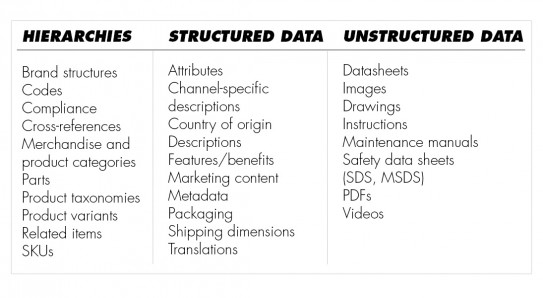
Product Master Data Management for happy customers and operational excellence
Product data touches every process in your organization. Accurate and timely product data makes all the difference: happier customers and smoother operations.
Product Master Data Management (PMDM) is the MDM domain focused on products. It brings all the product data into one place to create a single source of truth. This allows you to feed your systems, customers, retailers and partners with consistent, accurate and timely product data. PMDM ensures your customers find correct and rich product details in your catalog, webshop and sales channels.
Another word for PMDM is product information management (PIM), which used to be a stand-alone solution for products. Now, under the umbrella of MDM, product master data is put in the right context next to master data for customers, suppliers, locations, assets and more.
So, what exactly is product master data?
What Is Product Master Data?
Product master data is all the data about a product that describes its function, features, usage, and configuration. It consists out of text, numbers, value lists, structure (or hierarchy) and relationships, as well as assets such as images, videos, certificates, documents, and other rich media files.
All the information is available in the required languages and over time, all the changes are saved in different versions.

Product master data can involve countless attributes, relationships and records living in disparate and siloed systems, applications and locations across the enterprise value chain. Different examples are:

Where Is Product Master Data Used?
Product data is used everywhere. From the webshop or shop floor (brick-and-mortar stores) to printed catalogs, confirmations and invoices, marketing campaigns, data pools, claiming guarantees and searches for replacement parts.
That makes managing product data in a central solution a necessity for everyone. Even small organizations with only one platform or one distribution channel can still have thousands and thousands of products that need to be managed and enriched.
Typical scenarios where PMDM adds additional value are:
- Retail and distribution channels: Collaborate with suppliers to quickly onboard products. This allows you to rapidly move products and associated data across multiple channels and to connect with end consumers.
- E-commerce and CMS: Omnichannel or online retail teams post product information to multiple channels from a single repository that needs to provide accurate, timely information.
- Digital Asset Management (DAM): Digital assets such as product images, videos, metadata and rich content are managed and referenced with a DAM. It’s mostly used by the marketing department. The DAM can be a prebuilt function in the MDM or a standalone solution that’s integrated with PMDM.
- External data channels: Content service providers (eg. data pools), data feeds and marketplaces enable retailers and their vendor partners to share and onboard product data and content.
- Internal channels: Product data touches all the dynamic functions of your organization. Starting with production, sales and marketing, to customer support, operations, logistics and finance. Working with correct and accurate product data results in fewer product returns and better customer service.
- Print: At times, a customer would still like an overview on paper. This can be a relatively simple product sheet, a somewhat more extensive price list or a complex catalog. Producing a printed catalog in multiple languages covering a vast product range can be challenging.
- Regulatory Repositories: Organizations such as GS1 and industry or government agencies such as the FDA ensure compliance with industry, consumer and food health safety standards.
In all these cases, product data is used and stored in multiple, often siloed, systems and processes. Throughout the product lifecycle, data can be stored in spreadsheets or single product databases across disparate systems and departments. The dangers of having several versions of a single product are manifold. From incorrect product descriptions that lead to product returns and customer complaints, to marketing without impact and overall inefficiency across the enterprise. Bad product data quality negatively impacts basically everything, but most of all the product itself.
Superior Products Require Superior Quality Data
In the age of information, quality product data is simply part of a product. And yet, many companies today struggle to ensure its accuracy and availability across their processes, systems, channels and the whole value chain. What they need is a disciplined approach to manage their product data. By acquiring, enriching, distributing and improving its quality, PMDM helps them to create superior quality data. PMDM aims to turn product data into a business building asset to ensure its:
- Completeness: Incomplete data means the product is incomplete. The completeness of product data has a direct effect on sales.
- Accuracy: Questions about data accuracy can slow down a product’s time-to-market and its potential.
- Integrity: There is no such thing as too much trust. Bringing it to data calls for a quality-focused process and governance.
- Timeliness: Outdated information fuels misinformed decisions and leads to costly business outcomes.
- Compliance: Critical processes combined with bad data risks regulatory and industry compliance.
- Consistency: Maintaining consistency across channels, borders and markets is challenging, but mandatory to stay in business.
- Context: Push the right product information based on contextual parameters such as country, region, language or supplier relationship.
With quality product data in place with PMDM, your organization can reap many business benefits.
The 8 Business Benefits of PMDM
A single source of truth for product data integrates knowledge from across the enterprise, drives actionable insights and leads to superior decisions, improves competitiveness and creates success in the digital environment. The key business benefits of PMDM for your organization are:
- Superior experiences: Leverage accurate, up-to-date product information to fuel engagement and drive customer loyalty. By showing consistent data on all channels, the customer experience improves. PMDM can improve customer retention by 8%.
- Faster time-to-market: Launch and onboard new products and services faster and win the first-mover advantage. Time-to-market can be reduced by 80%. Global growth and market expansion is supported by localized content and promotions.
- Drive revenue: Upsell and cross-sell can increase revenue up to 30% with PMDM.
- Inspire innovation: High-quality data fuels superior agility and decision making insight.
- Improve collaboration: Eliminate barriers, strengthen relationships and improve trust.
- Reduce risk: Ensure regulatory and industry compliance and remove error-prone manual processes. Specifically, food health safety regulations demand a PMDM in place.
- Empower transformation: Consolidate processes to drive digital business performance and value. Across the enterprise value chain, the collaboration is improved.
- Lower costs. Without a holistic view of your data sources, your product team spends its valuable time searching across systems and departments, combining spreadsheets and verifying accuracy. Research from Experian suggests this cleanup process can cost 15-25% of a company’s revenue.
Fuel for Your Digital Success
Having quality product data is paramount for your digital success today. By adopting a PMDM strategy, you’ll reduce needless expenses, empower your employees and build more meaningful relationships with your customers. PMDM helps you to develop your e-commerce and improve operational excellence by making your product data accessible for everyone across the value chain. With the strategic value and benefits of PMDM clear, you might wonder where to start or how to build the business case. Our PMDM specialists are happy to discuss your product data challenges.
Read more about Master Data Management in our dedicated page here.

Whitepaper
Freeing Your Siloed Data
Improve data quality and reduce your data-related costs: the value of Master Data Management
Did we pique your interest?
Get in touch to discuss how we can drive your digital success.
CONTACT US


